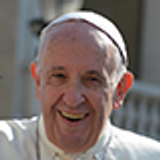
You’ll find all this and more at a Catholic school.

You’ll find all this and more at a Catholic school.
Everyone has questions—especially when it comes to the big stuff. Through engagement with the Religious Education curriculum, students have the opportunity to explore these questions, discover the Catholic faith, and build confidence in what they believe and why.
K-6 (Primary School) Religious Education Curriculum
In the primary years, the Religious Education curriculum is based on the four movements of the Emmaus story (Luke 24:13-35):
Applying the same level of rigour as they do to every learning area, our dedicated primary school teachers nurture each student's relationship with Jesus Christ through Catholic catechesis (teaching the faith) and prayer and practices (living the faith). By incorporating storytelling and creative arts into the curriculum's delivery, students are deeply engaged and supported to develop all aspects of Religious Literacy.
The content and themes of learning aim to lead students towards love of God, love for others, and love for all of creation, as they become open to the presence and activity of God in their lives. Ultimately, Religious Education is designed to help students encounter Jesus, understanding that “we love because he first loved us” (1 John 4:19) and empowering them to contribute positively to the culture and their community.

Each year, students in Year 5 and 6 are invited to explore the Christmas story through art. Hundreds of budding young artists take part each year, with finalists having their pieces displayed at a public exhibition in the Wollongong City Art Gallery.
Learn more and view the digital gallery7-12 (Secondary School) Religious Education Curriculum
The 7-12 Religious Education Curriculum assists students to reflect, celebrate, and live more deeply the mystery of Christ. As students mature into their teenage years, the curriculum encourages students to explore their questions and enter into a relationship with Jesus, while challenging them to live out the Gospel values in their everyday lives.
Students are invited to examine the Scriptures, participate in personal and communal prayer, and live out the Catholic Social Teaching of the Church.
The secondary Religious Education curriculum provides opportunities for young people to develop themselves holistically based upon the teachings of Jesus so that they may become bearers of Christ’s love, act as a voice for good in the world, and live life to the full (John 10:10).

"We consider education to be one of the most effective ways of making our world and history more human."
The primary years Religious Literacy Assessment program evaluates how students use their literacy skills to communicate their understanding of the religious tradition to themselves, peers, teachers, and members of the wider community.
The assessment involves all Year 4 students across the Diocese of Wollongong and consists of a multiple choice paper. Questions are focused on students' knowledge and understanding of Religious Education concepts from Kindergarten to Year 4 and what they mean for the way we live.
Data gathered from the assessment are analysed to inform teaching in schools, and to recognise and celebrate learning in the domain of Religious Education in the Wollongong Diocese.
Through the Religious Education curriculum, young people are exposed to the core teachings of the Catholic faith, our Scriptures, and the history and tradition of the Catholic Church. Students are equipped with the ability to act like Christ as they encounter the many experiences life offers them. Developing students’ Religious Literacy is central to these aims.
Religious Education is treated with the same rigour as other subjects, including in the approach to assessment and reporting. As part of this approach, Year 8 students take part in an annual diocesan Religious Literacy Assessment. This assessment focuses on students’ knowledge and understanding of the key concepts that are taught throughout their Religious Education from all units of work across Stage 4, as well as the application of these concepts in their everyday life.
Type on the line above then press the Enter/Return key to submit a new search query